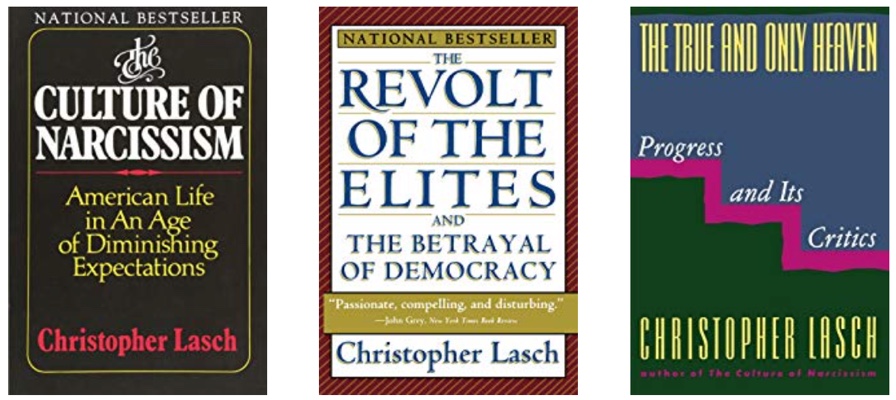The Scholar Who Didn’t Think History Had Ended – And What We Can Learn from Him
“Most of my recent work,” wrote the acerbic historian and social critic Christopher Lasch, while he was dying of cancer in the early 1990s, “comes back in one way or another to the question of whether democracy has a future.”
At the time, the Berlin Wall had recently fallen; the Soviet Union had disintegrated; the United States had emerged as the decisive victor in the Cold War. Western liberalism appeared ascendant, without rivals left on the world stage. Curious tourists and investors; specialists in market economics, advertising, public relations and civil society; corporate representatives and spokespeople for the various international entities reconfiguring the economic and social order; advertisers, consultants and academics, flooded into the former Eastern bloc, leaving people such as Vladimir Putin to stew in their juices, powerless to stop what from their perspective was a tragic onslaught. In the lingo of the day, it was the “end of history.” But history is full of surprises and, so far, it goes on and on. Lasch made an argument that, more than 25 years later, sheds light on our current situation, with the viability of the American Republic openly in doubt.
He argued that deep changes in the structure of American society were undermining what had made self-government possible (for those whose color and gender provided this opportunity in the first place). Throughout the nineteenth-century, people across the political spectrum agreed that the diffusion of property and power was necessary for democracy to work: by this measure, the United States at the edge of the twenty-first century, was failing.
In addition to the inequalities of wealth and power as factors in what Lasch called “the democratic malaise,” he traced a dangerous decline in “social or civic equality”— fewer opportunities for citizens to engage on terms of equality or to be actively involved in their own self-government. Meanwhile, drawing upon visions of human flourishing at the heart of the American experiment, he recognized the corrosive and overwhelming impact of money and market calculations in all spheres of life.
Such arguments were built on the foundation of Lasch’s improbable best-seller, The Culture of Narcissism: American Life in an Age of Diminishing Expectations, and a subsequent book, The True and Only Heaven: Progress and its Critics, in which he linked transformations in the economy—in patterns of work and consumption—to transformations in the motivating ethos of society that shapes character, the specific textures of everyday experience, the specific range of options for how to live.
In a nutshell, Lasch contrasted a Progressive, forward looking, consumer oriented, technocratic, cosmopolitan “culture of narcissism” with a rooted, Populist tradition that cherishes autonomy, civic engagement, craft, family, community, and a sense of limits, along with the sense of wonder that comes from being part of something greater than oneself.
As he was dying, Lasch continued to delve into the same themes. He sketched out the “revolt of the elites”—how those who benefitted most from globalization were abandoning place and community for cyberspace and cosmopolitan hubs that look alike no matter where on the planet they happen to be. Lasch argued that this was part of the decline of the nation-state and with it, the global decline of the middle class. From his perspective, this overall situation did not bode well for the future of democracy.
Around the time Lasch was writing The Revolt of the Elites and the Betrayal of Democracy, Ross Perot and Pat Buchanan were railing against NAFTA. Buchanan spoke about immigration in ways that foreshadowed what was to come. In 2016, Donald Trump became President with support from those who have been left behind in the wake of “progress,” by those living where the jobs have been shipped abroad and the shops have been shuttered, where the fabric of society has been shredded, where that dizzying feeling one can get from walking under the cheap lights in those endless Walmart aisles has, for a forlorn, disoriented, angry people, become the norm.
“Democracy works best,” Lasch wrote, “when men and women do things for themselves, with the help of their friends and neighbors, instead of depending on the state. Not that democracy should be equated with rugged individualism. Self-reliance does not mean self-sufficiency. Self-governing communities, not individuals are the basic units of democratic society. ”
I planned to study for my Ph.D. in American history under Lasch but he died during my first year of graduate school. I took his question about the viability of democracy with me to Jerusalem when I moved there in 2006 to work on “conflict transformation.” In the years since, though I have less of it than before, I retain hope about the human capacity for self-government—for our ability to figure out decent and just ways to live together. I find myself turning to Lasch, whose analysis was immersed in traditions that are too often drowned out by the relentless noise of our age. Around the world, we see Western liberalism in retreat. The forces of tribalism grow stronger. The market continues to uproot what was once taken for granted. Americans remain separated into market segments and zip codes, with little opportunity to get to know one another across lines of difference.
The good news is that at the end of 2018 so much of what we have taken for granted appears to be up for grabs. The past was different. The future will be different. The question: in what ways? The answer is at least partly in our hands. We tried to export “democracy,” to box it up easily and reassemble it, yet neglected to care for the institutions, values, and practices, that make self-government possible closer to home. In our current situation, Lasch is worth paying attention to, even as we squabble among ourselves and confront the limits of an overtaxed environment that threatens to dislocate and destroy more than we can readily imagine or digest.
